Research at DIT
Pioneering & Vibrant
The Deggendorf Institute of Technology (DIT) invited to its fifth Day of Research on 8 March 2018. At the event, employees will present their current application-oriented research projects in short lectures and posters. Over 130 interested parties from industry, business, the public and the university found their way to DIT this year.
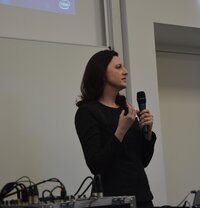 The 5th day of research was opened with a lecture by
The 5th day of research was opened with a lecture by
Dr. Helena Liebelt, Director Technical Computing Eastern Europe of the Intel GmbH and DIT Alumni about the importance of high performance computers for the advancing digitalization.
In seven-minute lectures by young DIT scientists, visitors to the event learned that nano-technology without health risks and negative environmental properties can contribute to increased sustainability and environmental protection by simply converting heat into electrical energy (e.g., by using a heat exchanger). Film on Smartphone), which is researching glass based packaging materials, as they are a healthier alternative for packaging food with aluminium, or as they are energy-efficient by networking computers in an office environment, they require little maintenance and a local server can easily be set up to protect against hacker attacks (Virtual Desktop).
In addition to ten exciting short presentations, employees of DIT and its technology campus presented on posters what they are currently working on and researching. The poster exhibition gave the opportunity for direct exchange with music (groove project) and a snack, sponsored by AVG Römer AG and the city of Deggendorf.
As last year, a scientific jury selected the best lecture. Dr. Christian Vogt (TC Teisnach) convinced the audience and the jury consisting of Prof. Dr. Terezia Tóth, Prof. Dr. Armin Eichinger and Dr. Kristin Seffer with his lecture on the optimization of grinding processes through validation. The innovation of this project, which leads to considerable increases in productivity and less rejects, was presented in an exciting lecture that was understandable for a non-expert audience in only seven minutes.
loosely and convincingly presented.
Christian Vogt received the Best Presentation Award, a glass cup, which was specially designed for this event last year by a master student of the Zwiesel School of Glass and is now produced every year for DIT.
This year, a scientific jury also selected the three best of the 30 posters on display. Prof. Dr. Christian Zich, Faculty of Applied Economics, Prof. Dr. Roland Zink and Prof. Dr. Martin Schramm, Faculty of Electrical Engineering, Media Technology and Computer Science, reviewed the posters. The award winners received a voucher for Pustet books.
The best poster chosen was "Food scanner: Simply determine food quality", a project at the TC Grafenau being carried out by Michael Fernandes. The Food-Scanner is a handy device, which helps to contain the throwing away of food by data evaluations in the household. Second place went to the poster "EEG-based Eye Tracking: The Use of Ocular Artifacts in Brain Waves to Control Multimedia Applications". This project is being worked on by Marc Philipp Dietrich, Faculty EMI, as a dissertation topic (supervised by Prof. Dr. Götz Winterfeldt) in cooperation with the University of Würzburg. Third place went to Raphaela Pagany's poster "WilDa - Dynamic wildlife accident warning using traffic, accident and environmental data". Ms. Pagany is working on the project at TC Freyung (with Prof. Dr. Wolfgang Dorner) and is doing her doctorate within the framework of this project in cooperation with the University of Salzburg.
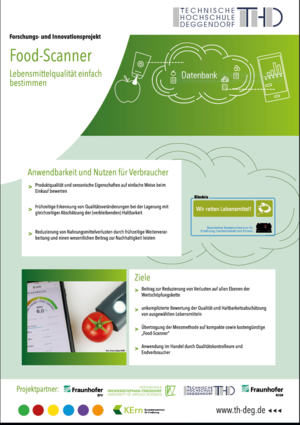
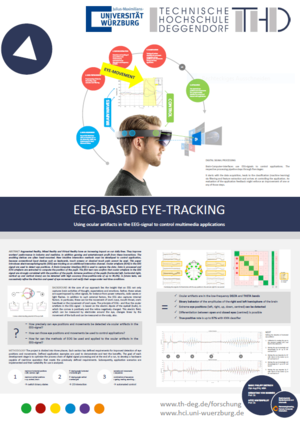
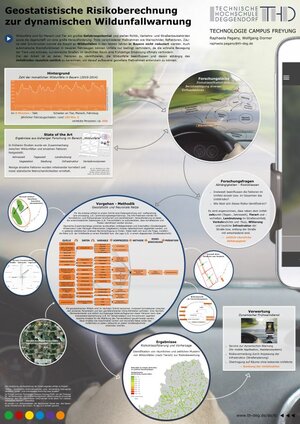
In addition, this year also an audience favorite was selected among the posters. Until the end of June 2018, it was possible on the PubinPlan platform to vote on which poster you liked best. The TC Grafenau poster on the subject of food scanners, which is intended to minimise the throwing away of food in private households, was also successful in this vote. Second place went to Raphaela Pagany with her poster for the Wildlife Accident Warning App and third place in the vote for the most popular poster to Dr. Andreas Gegenfurtner for Testing the Gender Similarity Hypothesis, an investigation into whether there are differences in motivation between women and men in continuing education.
This year's Research Day also honoured the young scientists who successfully completed their dissertations in 2017, some of them with distinction (→ Graduate Center). In addition, the best contributions in international conference proceedings were honored by DIT staff members.
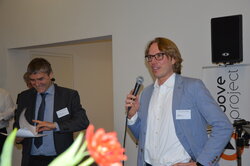
Prof. Dr. Roland Zink was honoured for a conference paper on sustainability "A Concept for Assessing Sustainability - The Sustainability Diamond", which was presented together with external colleagues at the renowned conference ICoRD 2017, International Conference on Research into Design, Guwahati (India). The conference paper developed a method to implement and evaluate sustainability at the product development stage. The sustainability diamond consists of three dimensions and six criteria at the interfaces between sustainability, use and other indicators.
Markus Eider and Diana Schramm were honoured as young scientists for the conference paper "Seamless Electromobility", which they presented with Prof. Dr. Andreas Berl and other external colleagues at a high-ranking conference in Hong Kong.
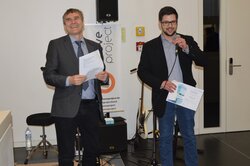 In this article, current challenges in electromobility are presented. In order to meet these challenges, various approaches are explained, such as sustainable, battery-friendly and cost-optimised fleet charging management.
In this article, current challenges in electromobility are presented. In order to meet these challenges, various approaches are explained, such as sustainable, battery-friendly and cost-optimised fleet charging management.
14.00 – 14.30 Uhr
Begrüßung und Grußworte
Vizepräsidenten für Forschung & Wissenstransfer der THD
Herrn Prof. Dr.-Ing. Andreas Grzemba
Bernd Sibler, Staatssekretär im Bayerischen Staatsministerium für Bildung und Kultus, Wissenschaft und Kunst
Anschließend: Ehrung der erfolgreichen Promotionen aus 2017
14.30 – 15.10 Uhr
Keynote
Dr. Helena Liebelt, Intel Corporation, Director Technical Computing Central European Region –
Digitalisierung und die Zukunft des High Performance Computing
15.10 – 15.25 Uhr
Prof. Dr. Reinhard Höpfl: Gründungsmöglichkeiten am ITC Deggendorf und am Gründerzentrum Digitalisierung Niederbayern
Julian Scheuchenzuber, Dipl.-Ing. (FH): Gründlich gründen im Digital Woid - Das StartUp Level51
15.25 – 15.45 Uhr
Kaffeepause
15.45 – 17.00 Uhr
Vorträge
Dipl.-Ing. (FH) Christian Vogt – Grinding Process Validation Approach (gPVA)
Dipl.-Phys. (Univ.) Michael Fernandes – Food-Scanner: Lebensmittelqualität einfach bestimmen
Dr. Manuel Bogner – Nanoscale Thermal Properties of next Generation Transparent/Flexible Thermoelectric Copper Iodide Films
Christina Sigl/ (B.Eng.)/Prof. Dr. Andreas Berl – WVDI Workstation-Based Virtual Desktop Infrastructure
Benedikt Krieger (M.Eng.) – Mehrwert durch 3D-Scans
Daniel Heinz (M.Sc.) – Virtuelles Testen und Prüfsystemdesign in der digitalen Fabrik
Michael Heigl (M.Sc.) – Forschungsprojekt DecADe (Decentralized Anomaly Detection)
Verfahren zur Analyse von Erneuerbaren Energien
Johannes Jakob (M.Eng.) – Rechnergestützte Optimierung von galvanischen Kupferabscheideprozessen
Liane Bingel (M.Sc.) – Clean Tech – Glas als Verpackungsmittel
17.00 – 18.00 Uhr
Postersession - Zeit für Austausch und Vernetzung
In der Postersession stellen die zehn Referentinnen und Referenten und weitere Angehörige der THD aktuelle Forschungsprojekte zu den vier Forschungsschwerpunkten vor. Die Postersession bietet Zeit für Austausch und Vernetzung bei einem kleinen Imbiss und Musik (Peter und Tobias Meier)
Ressourceneffizienz - Material
Christian Schopf – ArenA-Foi – Erprobung des ADAPT-Polierwerkzeugs
Christian Trum – Erweiterte Methode zur Charakterisierung von Poliersuspensionen
Sebastian Sitzberger – Analyse des Einflusses des Werkstückeigengewichts in der Präzisionsoptikfertigung mittels FEM-Simulation
Dr. Olga Kukso – Entstehungsmechanismen mittelfrequenter Fehler und deren aktive Vermeidung – EmmaV
Messtechnik – Digitalisierung
Prof. Dr. Gerald Fütterer – Etalon Effect Suppression in Optical Measurement by Using Complex Coherence Optimization
Marc-Philipp Dietrich – EEG-basiertes Eye-Tracking: Die Nutzung okularer Artefakte in Gehirnwellen zur Steuerung von Multimediaapplikationen
Anne Weinfurtner – Crowdsourcing-basierte Verortung historischer Fotografien zur Aufbereitung von Fotoarchiven
Dr. Andreas Gegenfurtner – Geschlechterunterschiede bei der Bewertung von beruflicher Weiterbildung
Monica Ciolacu – Education 4.0 for Tall Thin Engineers in a Data Driven Society
Energie
Christina Sigl – Smart Grid – Technologien für ländliche Gebiete und KMU
Markus Eider, Nicki Bodenschatz – Optimized Charging of Electric Vehicle Fleets
Robert Mnich, Josef Kinzel – Modellierung des Vergasungsprozesses von Holz
Mobilität/Verkehr
Raphaela Pagany – WilDa – Dynamische Wildunfallwarnung mit Hilfe von Verkehrs-, Unfall- und Umweltdaten
Kushal Choksi – Speed Measurement Unit
Martin Steininger, Roland Zink und Gerald Kupris – Genauigkeitsmessung verschiedener GNSS-Empfänger - Studie zur Nutzung von GNSS-Empfängern für autonomes Fahren
Gesundheit
Momina Zulfiqar – Healing Art – Exploring the Relationship Between Creative Arts, Medical Illustration, Informatics and Their Health Outcomes
Jessica Ortiz Huerta – Practical Applications of Intercultural and Interdisciplinary Communication in Higher Education
Sima Behbahani – A Study on the Impact of Puppet Shows on the General Mental Health of Traumatized ChildrenUsing a Web-based Platform
Lena Göhrlich – Implementierung eines systemischen Prozesses im Behördlichen Gesundheitsmanagement bei der Polizei Niederbayern
18.00 Uhr
Preisverleihungen